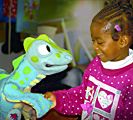Families First: Evidence-Based Support for Parents in Miami-Dade

Check out our blog for social-emotional learning articles, news, and more!

Objectives: To evaluate electrodermal activity (EDA) as a prospective biomarker of treatment response, to determine whether patterns of EDA are altered by treatment, and to assess oppositional defiant disorder (ODD) as a possible moderator of trajectories in EDA after an empirically supported behavioral intervention for attention-deficit hyperactivity disorder (ADHD) in preschool.
Method: Nonspecific fluctuations (NSFs) in skin conductance, which index sympathetic nervous system activity, were assessed among 4-6 year old children with ADHD (n = 99) before they participated with their parents in 1 of 2 versions of the Incredible Years intervention. All were reassessed at posttreatment, and a subgroup (n = 49) were assessed again at 1-year follow-up.
Results: No difference in pretreatment NSFs was observed between ADHD participants and a group of normal control children (n = 41). Nevertheless, among those with ADHD, fewer NSFs at pretest predicted poorer treatment response on 4 of 7 externalizing outcomes. Furthermore, treatment was associated with increasing NSFs across time, but not for those who scored high on ODD at pretest.
Conclusions: Low EDA appears to mark resistance to treatment among preschoolers with ADHD. Furthermore, although our study was not experimental, treatment was associated with longitudinal increases in EDA, which were not observed in a normal control group. This may suggest increased sensitivity to discipline, with positive implications for long term outcome. In contrast to treated participants as a whole, however, those who scored high on ODD at pretest exhibited reduced EDA over time.





